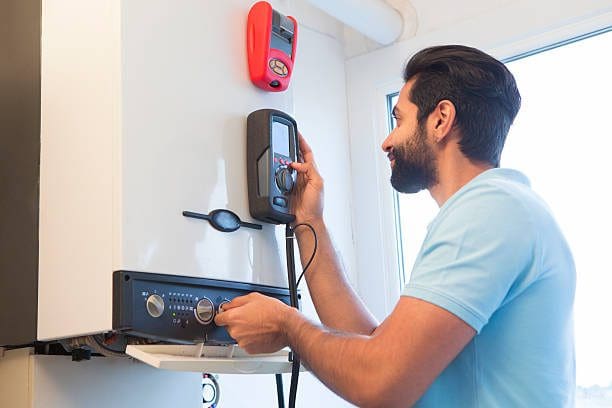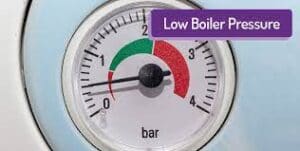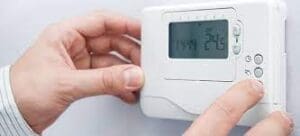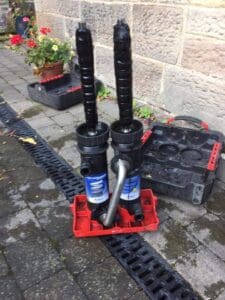10 Common Boiler Issues and How to Fix Them
As a homeowner, you may not think much about common boiler issues until it starts causing you problems. If your boiler isn’t firing up, it could be a number of reasons and that#s where we can help with giving you some helpful information on how you can possibly fix the issues yourself if it is just something simple. If you can’t figure out why it’s stopped workimng, it’s always best to call a professional. A qualified engineer will be able to troubleshoot the problem and get your boiler up and running again in no time.
Looking for a peace of mind, try one of our boiler care plans.
Common Boiler Issues
No Power
If your boiler has no power, the first thing that you should check is the main fused switch. This would normally be right next to the boiler itself.. Check to see if the switch is off. Turn it back on again and wait a minute to see if the boiler lights up. If the fused switch is on and nothing happens then it could be a blown fuse.If the fuse has blown, simply replace it with a new one and turn the power back on again. If the problem persists, you will need to call a qualified engineer to take a look at your boiler issues.
In most cases, a loss of power is due to either a tripped circuit breaker or blown fuse. However, it could also be a boiler issue Either way, in which case you would need to call a qualified heating engineer.
Airlocks
If your boiler has trapped air, it can cause a number of boiler issues. The most common problem is that the boiler does not heat up heat up properly. Trapped air may also cause the boiler to make strange banging noises. If you have noticed any of these problems first try bleeding the radiators to see if that helps. Get a rag and place it under the vent plug that you want to bleed the air from on each radiator then open with the bleed key until water comes out.
Don’t forget to close the vent plug! If that doesn’t work, you may need to to contact a qualified engineer who will be able to diagnose the boiler issue and resolve it. It may well be that the air is trapped inside the boiler and this must be rectified by a gas safe engineer.
Boiler Kettling
Another common boiler issue is kettling. This happens when water is heated too quickly and reaches boiling point and air to becomes trapped inside the boiler. The trapped air gives off a noise just like a kettle. Kettling may be caused by a build up of limescale which would cause the water in the heating system to slow down and then starts heating the water too quickly.
Another possible cause of kettling could be a faulty thermistor that allows the water to heat up water to higher temperatures than expected. A heating engineer would be able to inspect the reasons for your boiler issues and get it up and running again.
Low Pressure
If a boiler is not maintained properly it can develop boiler issues that can be costly to repair. One common problem is low pressure. Low pressure can be caused by a number of things such as: a leak in the system, a faulty guage, or a faulty pressure relief valve. If left unchecked, low pressure can cause the boiler to overheat and possibly damage a component. It is important to have any boiler issues checked by a qualified heating engineer. Dealing with boiler issues as soon as you identify them will save you money on costly repairs in the futurere and can help ensure that your boiler stays safe and reliable for years to come.
Frozen Condensate Pipe
A frozen condensate pipe can be a big problem when the temperature starts to drop below freezing in the winter months. This normally happens when the pipe is run externally and is either of a too small diameter or not insulated properly to protect the pipe from freezing. If the condensate pipe freezes, the boiler will automaticall shut down and trow up an error code. Every boiler is different but if you check the user manual, it may have the error code that identifies with a frozen condensate pipe.
For an emergency, you can disconnect or cut the pipe from underneath the boiler and place a tub on the floor to catch the condensate but this boiler issue will still need fixed. A heating engineer will be able to visit your home to install new larger diameter pipe and insulate it to help prevent it from freezing again.
Boiler Not Responding To Thermostat
Many homeowners control their boiler via the thermostat. When your boiler stops responding to the thermostatic control, it will most likely stop working.
So, what might be causing this boiler issue?
You first want to try the simple things like, ensuring that the batteries are still good. If it’s not that, you might want to check to see if the schedule is set for the times that you wanted the boiler on/off. If it is still not responding, there might be an issue with the wiring inside the boiler which will need to be checked by a qualified heating engineer.
Blocked Burner
A blocked burner is another one of the common boiler issues. If the burner is blocked it can lead to a number of issues such as poor efficiency, increased gas consumption, or even complete boiler failure. The good news is that its’usually simple to fix. The first step is to identify what’s causing the blockage. The leading issue is debris, which is caused by lack of servicing. You need to call a heating engineer to clear the blockage then your boiler should start working again.
Radiator Issues
When you feel the top of your radiatior and it is cold, this is normally caused by air in the radiator. You could simply bleed the radiator and it should start warming up. When the radiator is cold this could be caused by a sticky or faulty thermostatic radiator valve. Sometimmes it’s a quick fix by taking off the valve head and trying the push the pin in. If it soesnt push in, you will likely need to have the valve replaced.
Cold patches at the bottom of the radiator is normally a sign that you have a build up of sludge in your heating system which could hace severe consequences if left unattanded. In this situation it would be advised to call a heating engineer to come ant test the quality of your water in the heating system. If it has been identified as sludge, you should have the system cleaned by a professional.
Damaged Diverter Valve
A diverter valve is a device that controls the direction in which hot water enters a heating system. The diverter valve is responsible for redirecting hot water from the boiler to the radiator when the thermostat calls for heat. If the diverter valve becomes damaged, it can cause a number of problems with your heating system. If the valve is stuck in the open position, it will allow hot water to flow into the radiator even when the thermostat is not calling for heat.
This can cause the radiators to overheat. Alternatively, if the valve is stuck in the closed position, it will prevent hot water from flowing into the radiator, resulting in no heat being produced. Either way, a faulty diverter valve can be a serious problem that should be repaired as soon as possible.
Pilot light keeps going off
Older boilers normally have a permanent pilot light which needs to stay lit in order to light the burner within your boiler. If the pilot keeps going out there could be a faulty thermocouple that is shuttingoff the gas supply. It could also be a caused by a draught that keeps blowing the light out.
If you feel comfortable with trying to ignite the pilot yourself follow the instructions in the maual. first you need to ensure that your gas stopcock is on and that there are no issues with your gas supply. If you have a gas cooker, turn it on to make sure the gas supply is good. It is highly recommend that you contact a Gas Safe registered engineer to help solve this boiler issue.
If the issue with your pilot light persists, it may be worth getting a new boiler installed.
Conclusion
If you are experiencing any of the common boiler issues that were outlined in this blog, please take action as soon as possible. Waiting too long can lead to more expensive repairs and even a replacement of your boiler system. Contact us today if you need help resolving any boiler-related issue – we are here to help you!




